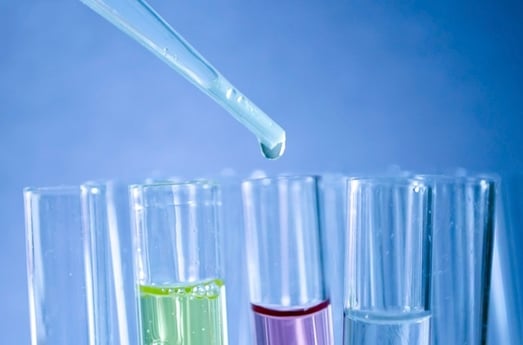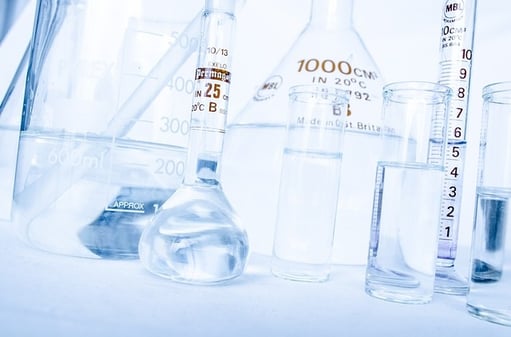
If you’re taking chemistry, you’ll undoubtedly need to know the 7 strong acids. Read this guide to learn what the 7 strong acids are, why they’re important, and why they’re not necessarily the most dangerous acids you’ll be working with in the lab.
What Is a Strong Acid?
When an acid is labelled as a strong acid, it actually has nothing to do with how powerful or corrosive it is. The “strength” of an acid simply refers to its ability to release hydrogen ions into a solution. Strong acids are acids that completely dissociate into their ions in water. This means that, in a solution, all of their molecules break up. Strong acids yield at least one hydrogen cation (H+) per molecule. Weak acids, on the other hand, will dissociate less than 1%, which means very few of their molecules will break up to release a hydrogen ion.
Why is this important? It has to do with chemical reactions. Here is the ionization reaction of the strong acid, hydrochloric acid:
HCl → H+ + Cl-
Notice how there is a hydrogen ion in the product. All of the reactant (HCl) has been ionized during the reaction. Also notice that the reaction only proceeds in one direction. Once the strong acid has been ionized, the reaction stops and is not reversible.
Here is the reaction of ethanoic acid, a weak acid:
CH3COOH + H2O ⇆ H3O+ + CH3COO-
Notice here that the reaction arrow points in both directions. This means that the reaction proceeds in both directions, which isn’t the case for strong acids. Weak acids only slightly disassociate, and their hydrogen ions will continue to move between being part of the weak acid and part of the water. This reaction is reversible and will reverse itself many times, reforming the acid.
In the next section, we list all 7 strong acids, and we encourage you to memorize them. However, if you forget if an acid is strong or weak, you can also look at its equilibrium constant/acid dissociation constant (Ka). Strong acids will have large values for Ka, while weak acids will have very small values for Ka.

List of Strong Acids
There are only 7 strong acids; all other acids are weak. They are listed below by name and chemical composition.
|
Acid Name |
Chemical Composition |
|
Chloric acid |
HClO3 |
|
Hydrobromic acid |
HBr |
|
Hydrochloric acid |
HCl |
|
Hydroiodic acid |
HI |
|
Nitric acid |
HNO3 |
|
Perchloric acid |
HClO4 |
|
Sulfuric acid |
H2SO4 |
Strong Acids vs Concentrated Acids
It’s important to realize that strong/weak acids are not the same as concentrated/diluted acids. These terms are frequently misused and incorrectly substituted for each other! The concentration of an acid refers to how much water or solvent is in it. A concentrated acid has a small amount of water, while a diluted acid has a large amount of water in it. You can have a strong acid that is diluted as well as a weak acid that is concentrated.
There’s no standard concentration that determines whether a substance is concentrated or diluted, but, in general, concentrated acids will have a pH around 3, while diluted acids will have a pH closer to 7.
Strong Acids vs Corrosive Acids
Just because an acid is strong doesn’t mean that it’s corrosive. Corrosiveness refers to how much a substance damages a surface it touches. Living tissue (such as skin, eyes, etc.) is often used as a reference point since people want to know any potential risks of substances they’re working with.
Some chemicals are so corrosive they can eat away flesh and bone, but, again, the strength of an acid isn’t related to how corrosive it is. The two terms measure different, unrelated things. Some strong acids are very corrosive, such as hydrochloric acid (which can eat through stainless steel) and sulfuric acid (which is commonly used as a drain cleaner). However, weak acids can also be extremely corrosive, such as hydrofluoric acid, which can decalcify bone.
When corrosive acids are diluted, they will often have less of a corrosive effect due to their low concentration. In this case, they may only act as an irritant and cause milder reactions such as itchy or red skin.
Acids, oxiders, and bases can all be corrosive. The word “caustic” is sometimes used as a synonym for corrosive, but it can only refer to strong bases, not any acids.

Summary: List of Strong Acids
There are 7 strong acids: chloric acid, hydrobromic acid, hydrochloric acid, hydroiodic acid, nitric acid, perchloric acid, and sulfuric acid. Being part of the list of strong acids doesn’t give any indication of how dangerous or damaging an acid is though. The strong acids and bases are simply those that completely dissociate in water.
Weak acids (which are all other acids) dissociate only a small amount. An acid's corrosiveness is a measure of how damaging it is to surfaces such as metal or skin. An acid can be strong but fairly safe to handle if it has a low corrosivity, but weak acids can also be highly corrosive and very dangerous to work with if proper safety precautions aren’t taken.
What's Next?
What is dynamic equilibrium and what does it have to do with rusty cars? Find out by reading our complete guide to dynamic equilibrium.
Looking for other molecular chemistry definitions and concept explanations? Read up on electronegativity and hydrates here.
Not sure what the difference is between physical and chemical changes? Dive into six in-depth examples of physical and chemical changes by reading our guide.
What are the most important science classes to take in high school? Check out our guide to learn all the high school classes you should be taking.
Have friends who also need help with test prep? Share this article!

Christine graduated from Michigan State University with degrees in Environmental Biology and Geography and received her Master's from Duke University. In high school she scored in the 99th percentile on the SAT and was named a National Merit Finalist. She has taught English and biology in several countries.

































 Holly R.
Holly R.